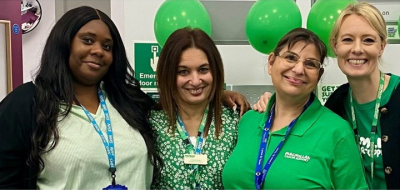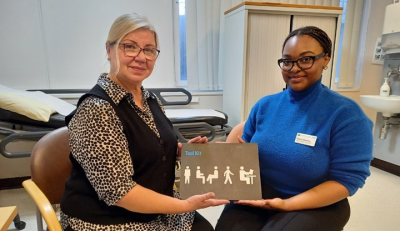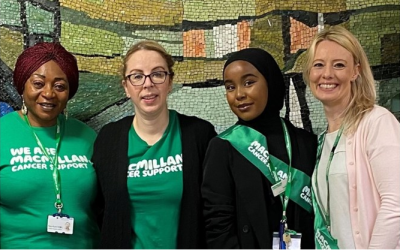Getting a cancer diagnosis can feel overwhelming and worrying. 
Every year thousands of patients are diagnosed with cancer and are treated at one of the RFL’s hospitals.
Staff and patients will be familiar with the welcoming Macmillan cancer information and support centres across the trust, but since 2018 a growing number of Macmillan support workers have been embedded in different cancer services across the trust, enabling them to reach out directly to patients. RFL is one of the largest providers of cancer care in the country, as a result of the recent merger with North Mid, with staff from North Mid’s newly-established personalised cancer care team also now on board.
When supporting a patient, the first step is encouraging them to complete a holistic needs assessment – a checklist tool where patients score different financial, practical, emotional and physical concerns from one to 10. Not every patient will need assistance but, thanks to their efforts to promote the service, the team have seen a significant rise in the number of patients requesting, and receiving, additional support.
Claire Marks, cancer support worker, said: “We work closely with the cancer clinical nurse specialists (CNSs). Initially patients get given the holistic needs assessment survey which shouldn’t take them more than 10 minutes to complete. Once that’s been submitted, we can phone them and start helping them get any extra assistance they need.”
“We want this to be a really meaningful conversation, so we focus on what matters most to each patient. After understanding the patient’s biggest concerns outlined in the survey, we draw up a personalised support plan. We also ask for permission to send a copy to their GP so everyone is on the same page.”
This conversation raises awareness of other ways the team supports patients, such as health and wellbeing pre and post treatment sessions. The pre-treatment support session called PREPARE takes place every fortnight, alternating between CFH and a community location in Hampstead near the RFH. The session lasts for two hours and patients who are preparing for cancer treatment are encouraged to bring a family member or friend with them.
Later on in their cancer journey, they also have the opportunity to attend an end of treatment group session called HOPE. Both sessions cover healthy eating, exercise, psychological, financial and work support, as well as help with treatment side effects/after effects and signposting to other support.
Azmina Rose, lead for personalised cancer care at the RFL, said: “PREPARE is so beneficial to recently diagnosed patients as it answers a lot of their questions in one go. They get the chance to speak to the clinical nurse specialists who join us during the tea break. 
Shalita Maloney, prostate cancer support worker, said: “When prostate cancer patients are first diagnosed it can feel very overwhelming and there can often be some embarrassment around some of their symptoms.”
As a response to what she was hearing from patients, Shalita has launched a quality improvement project where patients receive a ‘continence care-pack’ containing washable incontinence briefs, a RADAR key which gives access to locked disabled toilets nationally and a Macmillan “can’t wait” toilet card which they can show in shops, offices, cafes and pubs, so if they are caught short they can get to the nearest toilet without the need for awkward questions.
Shalita explained: “The doctors and nurses are absolutely brilliant when it comes to treatment but I’m here for everything that happens beyond treatment. I also really try to involve carers and family members as well, so they feel better informed.”
Angelika Cowell is a lung support worker. She said: “I help in the lung clinics as part of my role. Being there from the start gives me the opportunity to build a good rapport with the patients, which helps them open up about their concerns. The majority of my patients are older and not always IT savvy so me being there makes a big difference.”
She added: “We might not be physically saving lives, but we are preparing the foundations for life-saving treatments. For example, by helping patients understand the importance of exercise and heathy eating to help optimise their fitness for surgery.”
Recently Laura Wurzal, a colorectal cancer support worker, assisted with the first ever ‘KIT: Keep-in-touch’ event for patients who are a year post end of treatment.
She said: “This session is about putting everyone in a room and breaking down the barriers. We got to hear about lingering effects they’ve been struggling with but didn’t feel were big enough to raise. We saw a lot of phone numbers being swapped and WhatsApp groups being created!
“You don’t realise how different things are until you speak to friends or family who are treated elsewhere and don’t have access to this kind of support. I would call it exceptional.”
“Patients want to be listened to and heard,” said breast cancer support worker Katia Whilby.
“We get a lot of people saying, ‘Wow, you really do care about me as a person’.
“Often they might be reluctant to bother their consultant or nurse, but we’re approachable and they feel comfortable talking about their emotions with someone they perceive to be more on their level.”
Delphine Akem is the cancer support worker for the neuroendocrine tumour patients. The highly specialist service means patients attend from all over the country and often receive treatment for many years.

She said: “I make sure to introduce myself right at the beginning of their treatment, so I build that relationship from day one. I’ve been told I’m like another member of their family, that’s how close we become. They can tell me what happens behind closed doors, things they find it hard to tell the doctor. Because so many patients come from far away any support I can help with, in terms of getting to and from the hospital, is greatly appreciated.”
Azmina added: “Unless cancer comes and knocks on your door and turns your life upside down, you really can’t know the impact. My team is approachable and multi-skilled. We recognise how everyone’s situation is different and give them individualised support to help them on their journey.”
 Translate
Translate